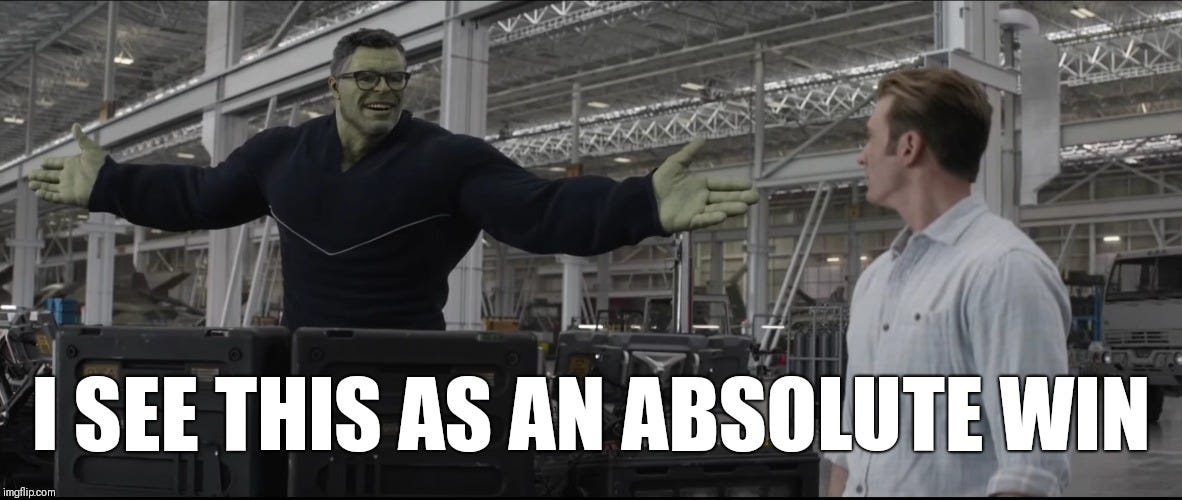Self-Checked Out
Automation Isn't the Problem. Capitalism Is.
You’re busy, so here’s what we’re covering today:
Self-checkout machines are awesome inventions corrupted by our economic system.
If workers owned their companies, automation would help, not harm.
If trends continue, complex tasks will be automated, destabilizing our society.
Technological advancements have long been seen as detrimental to the working class. Whether it’s the power-loom putting thousands out of work in 19th century England or the light bulb causing whaling ships to rot in New Bedford ports, technology that helps the owners has almost always hurt the workers.
First, let’s scream it from the rooftops —TECHNOLOGY IS GOOD. It saves lives, improves livelihoods, and enables humanity’s right to the pursuit of happiness (no one gets to chase their acting dream if they’re forced to hunter-gather). But, because capitalism uses technology for the purpose of reducing costs and increasing profits, the shiny new toys that should free workers from mind-numbing monotony are instead the catalysts of their misery.
Take for example the self-checkout machines punctuating our trips to Target (or Walmart, or Costco, or Whole Foods, etc., etc.). Ever since the first self-checkout machine replaced a cashier, we’ve known they were going to leave millions unemployed and destitute. But they don’t have to.
Regardless of who owns Target, these machines have the same function: humans are no longer needed for the repetitive task of ringing up shoppers and asking “cash or credit?” Whether Target is privately owned (i.e. capitalist) or owned by its workers, the machines’ function remains constant while the impact deviates.
Currently, Target is capitalist (publicly traded with investor dividends), so the machines are being used to replace the 40-or-so cashiers and baggers in each store. All that’s needed is a watcher to make sure shoppers aren’t pocketing Pokemon cards on their way out. For Target’s owners, this is a win! They cut costs (salaries) and succeeded in capitalism’s goal of making the profit line steeper and greener (more green?).
But for the aforementioned cashiers, this is a worse nightmare. While they probably weren’t impassioned by their work, it was the means to their livelihood. In a world where retail employees need food stamps to merely get by, losing a minimum wage job is an automated nail in the coffin.
To blame technology for this harm is misguided. The plight of the worker is not the fault of technology — it’s the fault of capitalism.
Now, let’s imagine Target wasn’t owned by private traders, but rather by its workers. So, in this zany, fairytale world, the cashiers, baggers, shelf-stockers, marketers, accountants, sign-spinners, video game testers (jealous), lawyers, and everyone else that actually makes Target valuable would own Target and run it democratically, electing board members to vote on pressing issues. Now, when the dreaded self-service-checkout-machine-salesman rolls into town, Target’s owner/workers would vote on if they want to purchase them. They could:
1. Not install self-checkout — Target would miss out on higher profits and wages, but all employees would remain.
2. Install self-checkout and fire the cashiers — This would increase profit and wages for remaining Target employees.
3. Install self-checkout and fire the cashiers with generous pensions — If Target was democratic, the out-going cashiers (and their sympathetic colleagues) could influence the vote for a generous exit package, including but not limited to: pensions, tuition to learn new trades, or early retirement incentives as Target phases from human to automated checkout.
4. Install self-checkout and move cashiers to other roles — As the cashiers are no longer needed, they could be trained for different jobs. Under a capitalist model, this would mean some workers would have their hours cut to make room for cashiers, but that is not the case in our Democratic Republic of Target. Because the workers are acting in their collective, they could keep incomes steady while reducing the number of hours each Targetter must work.
In short, automation = less work, same income.
Option 4 showcases the advantage of a worker-owned economy (some call this socialism) over a capitalist economy, as it makes technological advancements a universal good: self-checkout machines free humans from the comatose task of scanning item after item, day after day, year after year, without ANY negative drawbacks for those of us who want to buy an Xbox, exlax, and extra-large sodas at the same store.
Instead of spending their lives scanning my psychotic shopping list, these emancipated workers can live fully — they can write novels, raise their children, or, perhaps enjoy America’s greatest pastime, NFL RedZone. In other words, they can fulfill their right to life, liberty, and the pursuit of happiness. And, as technology advances and we no longer need humans to drive buses, fly planes, clean toilets, or produce sweet, sweet Chobani Yogurt, more and more of us will have the time and freedom to pursue our true passions and purposes, whatever they may be.
Unfortunately, our current economy puts profit paramount, so advancements like the self-checkout machine aren’t put to their maximal use. They benefit a select few while being inefficient for society as a whole. If current systems perpetuate, every job — from painter, to policeman, to professional ping pong player — will be automated, leaving the world destitute and penniless, save for a select few.
Procrastinators be warned: this isn’t the future’s problem. One trip into Amazon’s workerless store, and only one question remains — “how long until capitalism automates your job?”
Subscribe for some exciting upcoming topics, including but not limited to:
Barstool Sports is the future of conservatism
Conspiracy theories, QAnnon, and Donald Trump are the conclusion of capitalism.
Running governments “like a business” is very dumb.
Before you go, I want to share Learning By Proxy, a newsletter I’ve been reading that explains often hard-to-understand topics. If you enjoy JoeWrote, I suggest you check out their latest piece on the influence of “Small Oil.”




Good, easy to visualize description. But...Communism bad!